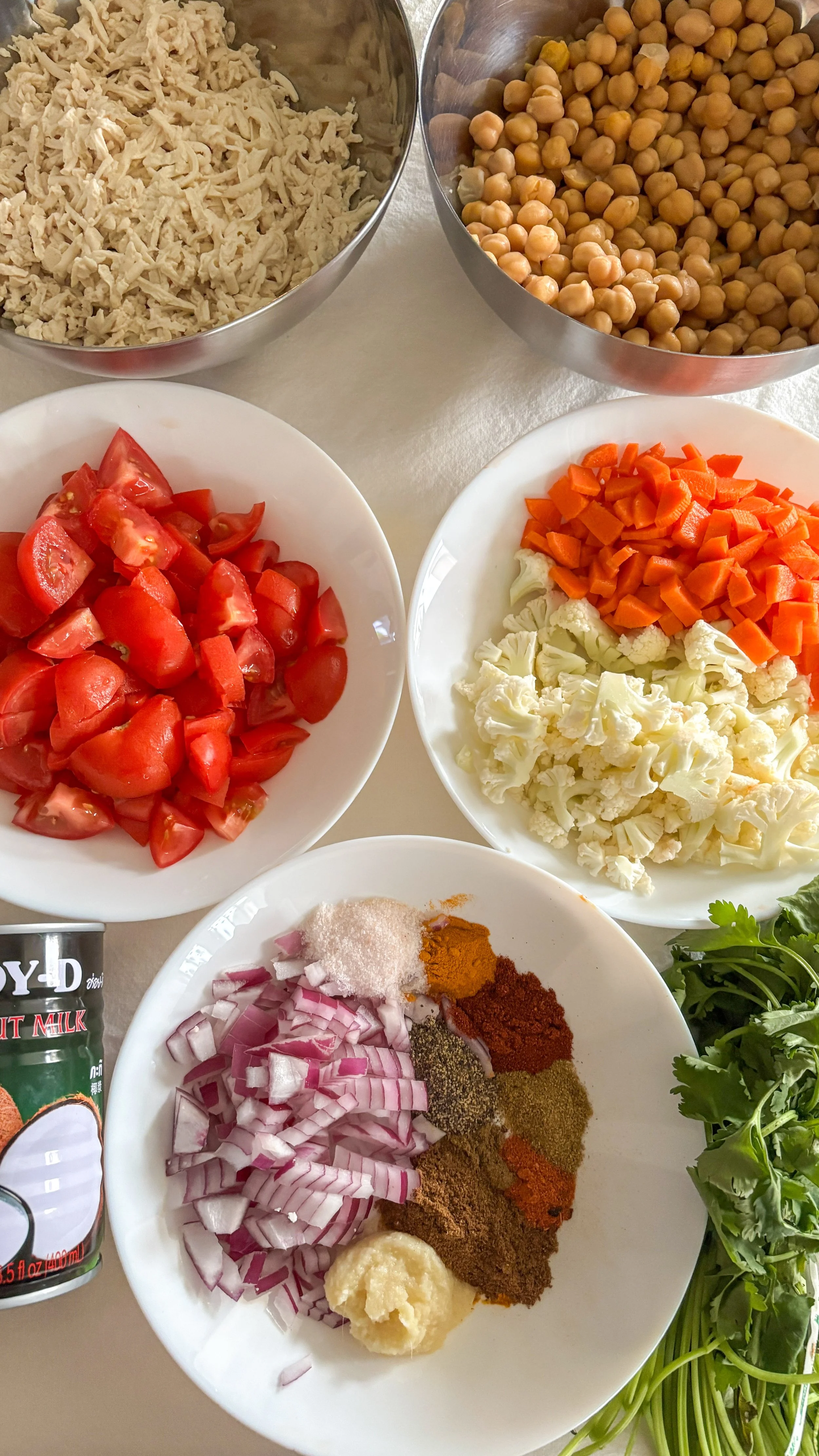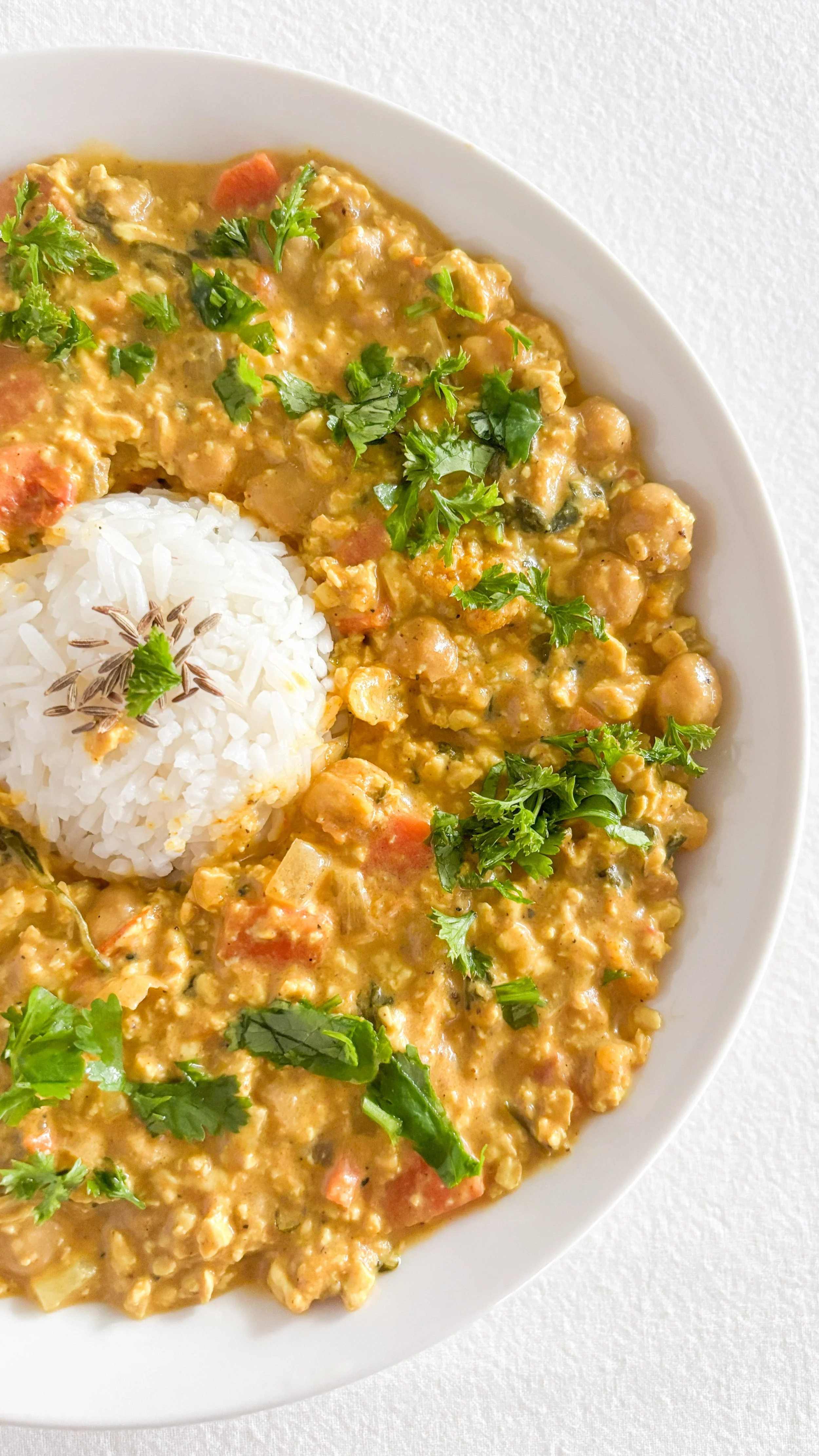Tofu chickpea curry (vegan)
For decades, meat has been widely viewed as the gold standard of protein. It’s complete, familiar, easy to cook, and deeply rooted in most cultural food traditions. But choosing one meatless day per week is not only achievable—it can be highly beneficial for women’s health, hormone balance, digestion, food diversity, and long-term wellness.
The idea isn’t to replace meat entirely or to diminish its value. High-quality meat provides bioavailable nutrients that are undeniably useful. Instead, it’s about balance, variety, and utilizing the full spectrum of nutrients available in whole foods—especially plants. Integrating a weekly meatless day supports metabolic flexibility, increases fiber intake, promotes gut diversity, and encourages exposure to different antioxidant and phytonutrient profiles.
Plant-Based Protein Can Be Strong, Satiating, and Supportive! While meat is considered a superior protein source due to its complete amino acid profile, plant-based proteins can still meet your needs, especially when combined thoughtfully.
Legumes, soy foods, and whole plant foods contribute:
Adequate protein, especially when eaten in generous portions
Fiber, which animal foods lack entirely
Prebiotics, feeding beneficial gut bacteria
Phytoestrogens, which may support hormone balance in many women
Micronutrients that complement what animal proteins lack (vitamin C, folate, magnesium)
The key is diversity and volume. A generous serving of chickpeas paired with tofu, for instance, provides a complete, satisfying, and nutrient-dense protein profile.
Why Tofu Is an Easy, Accessible Protein for Meatless Days?
Tofu is one of the most versatile plant-based proteins—mild, neutral, and able to take on any flavor you give it. For busy women, it is a practical option because:
It requires almost no prep.
It cooks quickly and blends seamlessly into soups, stir-fries, and curries.
It absorbs spices and sauces beautifully.
It adds both protein and creaminess without dairy.
It digests easily and pairs well with anti-inflammatory ingredients.
When shredded or cubed into a curry, tofu becomes “invisible” in the best way possible—boosting protein without taking over the dish.
A plant-based curry like the chickpea and shredded tofu coconut curry is more than a comfort meal. It contains several elements that support women’s health on a deeper level:
Tofu and chickpeas supply plant-based proteins and gentle phytoestrogens, which can support hormone balance, especially during perimenopause and menopause.
Coconut milk provides nourishing fats to help stabilize blood sugar and reduce cravings.
Onions, tomatoes, cauliflower, and carrots add antioxidants, microbiome-friendly fiber, and nutrient diversity.
Turmeric, ginger, garlic, coriander, and cumin improve digestion, lower inflammation, and support liver detoxification pathways involved in hormone metabolism.
A meal like this delivers satiety, warmth, minerals, fiber, and steady energy—everything a woman needs on a demanding day. You don’t need to choose between being fully plant-based or fully omnivore. One meatless day per week is an approachable, sustainable habit that strengthens your health, gives your digestive system a break, and encourages culinary creativity.
You’re not replacing meat—you’re expanding your nutrition.
RECIPE
Ingredients
550 g boiled chickpeas
450 g firm tofu, shredded
350 g tomatoes, diced
450 ml full-fat canned coconut milk (if you want a lower-fat version, use half coconut milk and half water)
100 g carrot, diced
100 g red onion, diced
100 g cauliflower, diced
2 Tbsp avocado oil
30 g fresh cilantro or parsley (or a mix)
1 Tbsp lemon juice
100 ml water if needed for consistency
Spices
1 Tbsp ginger-garlic paste
2 tsp garam masala
1/2 tsp chili powder
1/2 tsp cumin powder
1 tsp coriander powder
1 tsp paprika
1 tsp turmeric
1 tsp black pepper
2 tsp pink Himalayan salt (adjust to taste)
Instructions
Heat the avocado oil in a large pan over medium heat. Add all the spices and bloom them for about 30 seconds, stirring constantly to prevent burning.
Add the diced onion and tomatoes. Cook for 5 minutes, stirring occasionally, until the tomatoes soften and the mixture becomes saucy.
Stir in the diced carrots and cauliflower. Cook for another 5 minutes to begin softening the vegetables.
Add the shredded tofu, boiled chickpeas, and coconut milk (or coconut milk and water). Bring to a gentle simmer and cook for 20 minutes, allowing the flavors to meld and the sauce to thicken. Add some water if you want a more runny consistency (more like a soup).
Turn off the heat and stir in the chopped cilantro or parsley along with the lemon juice. Taste and adjust salt or seasoning as needed.
Serve warm with rice or gluten-free naan bread (recipe here).
Macros per 100 g of curry (approx.):
Calories: 117 kcal
Protein: 4.9 g
Carbohydrates: 9.7 g
Fat: 7.3 g
As usual, these are my thoughts and ideas, not medical advice. You are encouraged to create your own recipes or search for some suited to your needs. I am just sharing my recipes, hoping that I can inspire some of you to make healthier food choices.
Please remember that we all have different nutritional needs and that food affects us differently. If you are not sure which foods are best for you, reach out for a free phone consultation.
In good health,
Ioana



